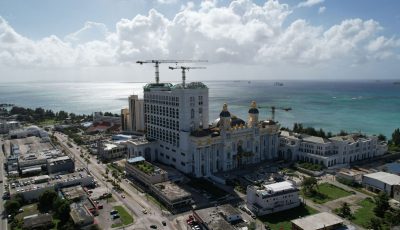Rebuilding bridge of hope
If there’s anything strangely definitive in recent past it’s the spout of indigenous rights to self-government. It’s bad enough that it is a protracted process. But we come along with grand mañana, disoriented and noncommittal, adding fuel to fire. It dies out quickly like a candle in the wind. Who needs a New Year’s resolution?
The march turns snail-like because it involves “we the people.” And though democratic elections provide a legal launching pad to throw out the bums, it’s the only vehicle available to gradually straighten and strengthen strong governance. As you can see, there remains a lot of public education to bring our people up to speed with issues before them.
•••
We relish spouting declamatory platitudes about it. Ironically, we refuse to put our best foot forward to address its very essence. Habitual and shopworn! Do we sleepwalk it as though we’re brain dead? Call it the purgatory or indigenous hellish hole of indecisions!
•••
The health of our people has degenerated beyond comprehension with Type II diabetes skyrocketing, including renal or kidney failure. Over 300 go through dialysis weekly, not to mention increases in chronic heart and cancer issues. Is this why the Legislature refuses to grant CHC operational funds of some $38 million?
•••
Policymaking has also devolved into the abyss of humiliation. The Legislature impeached a former governor for “lack of transparency.” Yet it violated its golden rule, sporting how to tiptoe casino through both chambers to prevent public participation. Asinine! Whatever happened to conscientious leadership?
The rush is the same as cows breaking out of the front gate destroying nearby farms. There’s obviously the lack of percipiency—ability to understand issues—as to overlook due diligence. It approved casino, ignoring to resolve land and basic infrastructure needs. Is advancing blindly to the rear the new mode of legislating? Embarrassing!
•••
Then there’s the arbitrary imposition of the social definition of landownership per proponents of Article 12. Why present it as though legally factual when it is simply a view? Isn’t landownership individually owned and fully protected by the U.S. Constitution? So what else is there to discuss regarding my rights to final disposition of my land?
•••
The term “economy” is a mouthwash the “we few” politicians and loyalists discuss with grand disorientation. You break the concept down and it simply means money. The greater question is: Would anything be accomplished in stride to improve salaries stagnant for years or would it stay basically unfulfilled? Strategic socio-economic planning is in order to grow the economy lest salary stagnates or stays the same for another decade.
A fickle single-legged economy isn’t going to cut it either and not when we’re obviously struggling to pay off court-stipulated obligations with CUC and the settlement fund. The NMI would be swimming upstream most of the way. Just healthy inaugural issues to glimpse beyond political formality. There’s still an opportunity to begin rebuilding the bridge of hope.
Chinese U.S. investment
Information that some 100 million wealthy Chinese folks leave the country in search of new homes and education opportunities abroad had my hopes high that the NMI would benefit from it.
My hope was dashed by news reports that our Chinese friends have been buying premium real estate across the country, USA. There’s the new incentive to buy real estate beyond prestigious addresses: the new 10-year visa for business travel and tourism, and the five-year visa for overseas study.
Thus, friendship begins new relationships among two of the most powerful countries in the world. Business travel and tourism should explode up ahead across the fruited plain. Here at home I’ve been assigned to bite my fingernails.
“Juwai, which means ‘home away’ in Mandarin, is a Chinese website for real estate buyers, headquartered in Shanghai, with another office in Hong Kong and one planned for Beijing, wrote William Hennelly of New York.
“Here is the U.S. government working with the China government on providing a jurisdictional incentive to encourage consumers to engage,” Taylor said of the new visas. “We think that’s the future of the world.”
“Juwai’s data show that 60 percent of affluent Chinese citizens are considering moving overseas, and 85 percent of that same demographic want to educate their children away from home. The U.S. is their top destination.
“The average price of properties that users inquire about is $1.17 million, but they have budgets for purchases about $3 million on average, according to Juwai.
“The U.S. city with the most Chinese investment in real estate is Los Angeles, followed by New York, Atherton, California (an affluent Silicon Valley suburb), San Francisco and Dallas, according to Juwai.” Would any of these folks invest here?



























